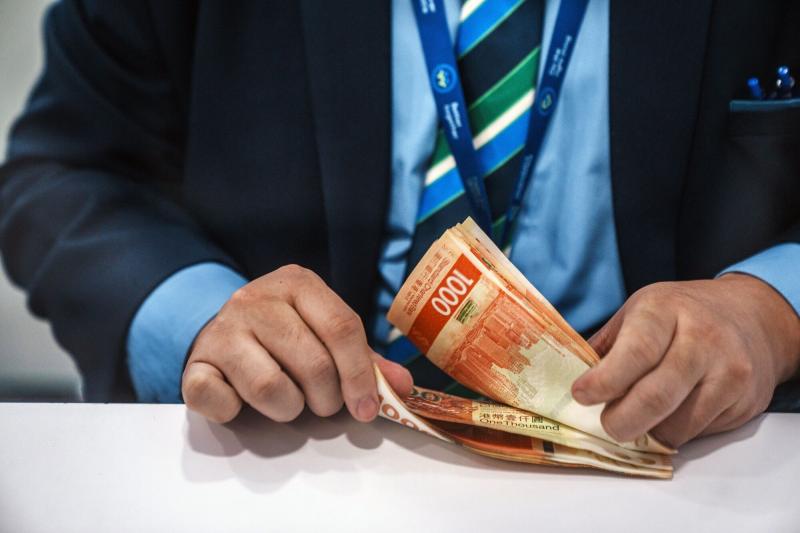Hong Kong intervened to defend its peg, buying a record amount of US dollars after the city’s currency rose to the upper end of its trading band.
The Hong Kong Monetary Authority (HKMA) spent HK$46,539 million (US$6 billion) on the US currency, its record one-day purchase of the US dollar, according to data compiled by Bloomberg that dates back to 2004.
An official at HKMA’s New York Representative Office confirmed the transaction, the first such intervention since 2020, by phone.

Photo: Lam Yik, Bloomberg
The latest move by the HKMA came as a weaker US currency pushed its Hong Kong counterpart toward the strong end of its 7.75-7.85-per-dollar allowed trading range.
Authorities have stepped into the market more recently to sell US dollars, including in 2022 and 2023, when the local currency threatened to breach the weak end of its trading band.
The HKMA intervention to limit the local currency’s rally comes at a time when other monetary authorities in the region contend with currency volatility. On Friday, Taiwan's central bank intervened in the foreign exchange markets as the New Taiwan dollar surged 3 percent against the greenback, marking its largest one-day advance since 1988.
The region’s currencies strengthened on hopes for a possible trade talks with Washington, the first sign since US President Donald Trump hiked tariffs last month that negotiations could begin between the two sides.
Trump’s policies on trade have sent shock waves through financial markets and caused some to question the US currency’s status as a safe haven. That’s seen traders bet against the US dollar and allocate funds away from the nation’s assets after years of piling in.
The Bloomberg Dollar Spot Index, which measures the greenback against a basket of major currencies, endured its worst month since 2022 last month. It is down 6.5 percent so far this year.
The Hong Kong dollar’s peg was put in place in 1983 to arrest the plunge in the exchange rate amid talks about the handover of the British colony to China. The trading band was widened in 2005, allowing the currency to trade from 7.75 to 7.85 against the greenback.

IN THE AIR: While most companies said they were committed to North American operations, some added that production and costs would depend on the outcome of a US trade probe Leading local contract electronics makers Wistron Corp (緯創), Quanta Computer Inc (廣達), Inventec Corp (英業達) and Compal Electronics Inc (仁寶) are to maintain their North American expansion plans, despite Washington’s 20 percent tariff on Taiwanese goods. Wistron said it has long maintained a presence in the US, while distributing production across Taiwan, North America, Southeast Asia and Europe. The company is in talks with customers to align capacity with their site preferences, a company official told the Taipei Times by telephone on Friday. The company is still in talks with clients over who would bear the tariff costs, with the outcome pending further

A proposed 100 percent tariff on chip imports announced by US President Donald Trump could shift more of Taiwan’s semiconductor production overseas, a Taiwan Institute of Economic Research (TIER) researcher said yesterday. Trump’s tariff policy will accelerate the global semiconductor industry’s pace to establish roots in the US, leading to higher supply chain costs and ultimately raising prices of consumer electronics and creating uncertainty for future market demand, Arisa Liu (劉佩真) at the institute’s Taiwan Industry Economics Database said in a telephone interview. Trump’s move signals his intention to "restore the glory of the US semiconductor industry," Liu noted, saying that

STILL UNCLEAR: Several aspects of the policy still need to be clarified, such as whether the exemptions would expand to related products, PwC Taiwan warned The TAIEX surged yesterday, led by gains in Taiwan Semiconductor Manufacturing Co (TSMC, 台積電), after US President Donald Trump announced a sweeping 100 percent tariff on imported semiconductors — while exempting companies operating or building plants in the US, which includes TSMC. The benchmark index jumped 556.41 points, or 2.37 percent, to close at 24,003.77, breaching the 24,000-point level and hitting its highest close this year, Taiwan Stock Exchange (TWSE) data showed. TSMC rose NT$55, or 4.89 percent, to close at a record NT$1,180, as the company is already investing heavily in a multibillion-dollar plant in Arizona that led investors to assume

AI: Softbank’s stake increases in Nvidia and TSMC reflect Masayoshi Son’s effort to gain a foothold in key nodes of the AI value chain, from chip design to data infrastructure Softbank Group Corp is building up stakes in Nvidia Corp and Taiwan Semiconductor Manufacturing Co (TSMC, 台積電), the latest reflection of founder Masayoshi Son’s focus on the tools and hardware underpinning artificial intelligence (AI). The Japanese technology investor raised its stake in Nvidia to about US$3 billion by the end of March, up from US$1 billion in the prior quarter, regulatory filings showed. It bought about US$330 million worth of TSMC shares and US$170 million in Oracle Corp, they showed. Softbank’s signature Vision Fund has also monetized almost US$2 billion of public and private assets in the first half of this year,